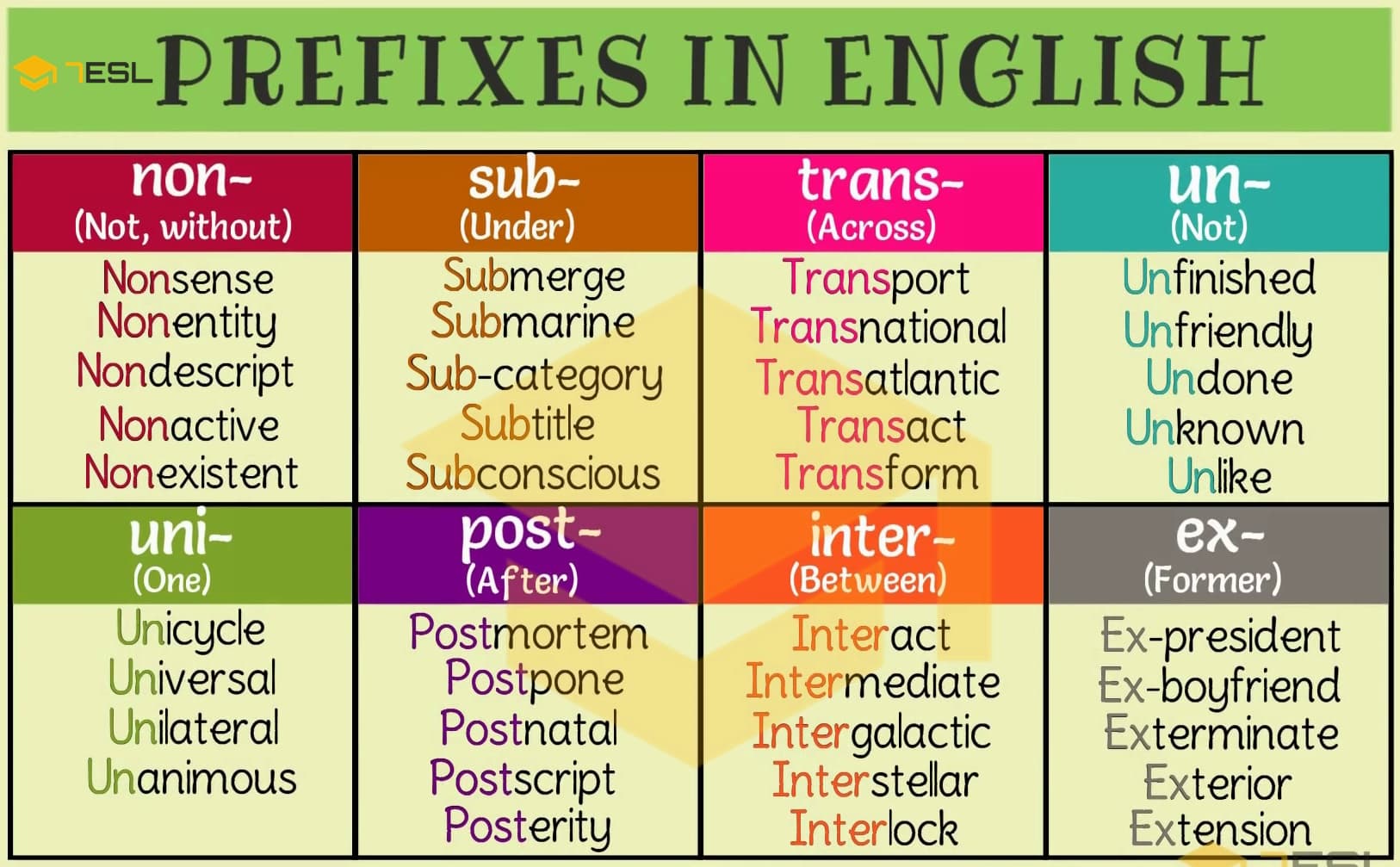Back to: ENGLISH LANGUAGE SS2
Welcome to class!
In today’s class, we will be talking about prefixes and verb forms. Enjoy the class!
Prefixes and Verb Forms

PREFIXES AS WORD EXTENSION
Let’s do a quick recap of our previous class on word formation process. In that class, you learned that word extension is also referred to as word formation process, which is the process of generating new words by adding either prefix or suffix to the root word.
I hope you still remember that.
Now let us move to our focus of today.
Prefixation
Prefixation is the process of word formation that involves adding prefixes to the original word in the initial position. In order words, a prefix is bound to come before the original word. We have quite a number of classification for prefixes and we are going to consider some of them here:
- Negative Prefixes: These prefixes are markers of negative words when they come together with a root word. Examples are in, un, non and il.
- un + able = unable
- un + kempt = unkempt
- dis + approved = disapproved
- dis+ regard = disregard
- il+ legitimate = illegitimate
- Location prefixes: These prefixes mark the location within and outside of a place. They include inter, sub, super andtrans.
- sub+ region = sub-region
- inter + national = international
- Number prefixes: These are prefixes which mark for numbers. Some of them include bi, di, tri, multi, poly and per.
- tri + angle = triangle
- multi + national = multinational
Other prefixes examples include the following:
- end +danger = endanger
- re + examine = reexamine
- fore + knowledge = foreknowledge
- semi + circle = semicircle
- auto + mobile = automobile
- un+ tie = untie
The following set of prefixes comes with hyphen or space between the prefix and the base word:
- pan +African = pan-African
- ex + president = ex-president
- vice + president = vice-president
- mini + market = mini-market
- co + operation = co-operation
Evaluation
Generate new words by adding ten different prefixes and root words together.
VERB FORMS
ACTIVE AND PASSIVE VOICES
Voice in the English language is a phenomenon that gives explanation to the role of participants in a sentence. There are two types of voices in English, the active and passive voice. In this lesson, you will learn about the verb forms that can function both in the active and passive sentence.
Voice
It is important to note the two important participants in English voice, the actor(the subject) and the affected(the direct object). In the sentences,He killed the ram(active); he is the actor while ram is the affected. However, both the actor and the affected are able to maintain their role even with the change in structure as a result of the voice: The ram was killed by him (passive).
We use the passive voice for different reasons as follows:
- When we do not know the performer of the action.
- To avoid mentioning the performer of an action or when there is no point mentioning the doer of an action.
- To direct and maintain focus on the direct object instead of the performer of an action.
Note that it is only possible to construct a passive sentence when the verb of the sentence is a transitive verb. A transitive verb is one that requires an object:
We invited the old man. (Active)
The old man was invited. (Passive)
The verb invited is a transitive verb, which makes it possible to be converted to passive voice.
Note also that there must be the same tense correspondence between the active and the passive sentence. For example:
My grandson eats one apple daily. (Active)
One apple is eaten by my grandson daily. (Passive)
The tense correspondence also reflects in the modal verb when it is used.
He could read the whole book in two hours. (active)
The whole book could be read in two hours by him. (Passive)
I told him he must not drive your car. (Active)
I told him your car must not be driven by him. ( passive)
The variants of the auxiliary verb ‘be’ (be, am, is, are, was, were, been, and being) are followed by the past participle form to arrive at the passive sentence. Consider the following sentences:
The police shot one of the robbers at the scene. (active)
One of the robbers was shot at the scene by the police. (Passive)
She made my clothes perfectly. (Active)
My clothes were made perfectly by her. (Passive)
Change the following to passive
- Her manners pleased us very much.
- The driver was blowing the horn.
- The police caught the thief.
- The hunter shot the tiger.
- They drew a circle in the morning.
- They will demolish the entire block.
In our next class, we will be talking about Prepositional Phrases. We hope you enjoyed the class.
Should you have any further question, feel free to ask in the comment section below and trust us to respond as soon as possible.
